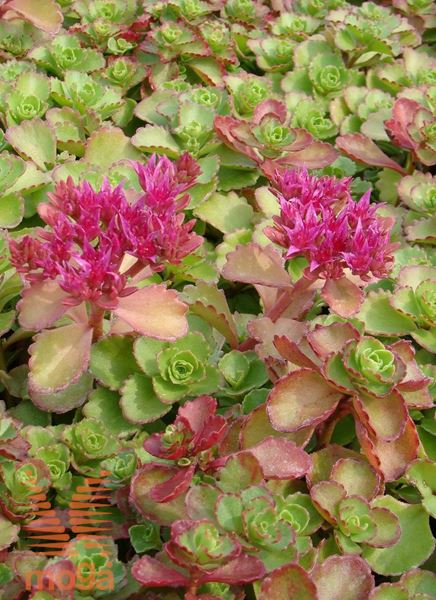Sedum spurium "Schorbuser Blut"
Sedum spurium "Dragon's Blood"
neprava homulica "Schorbuser Blut"
neprava homulica "Dragon's Blood"
-
These plants grow well in sun or in partial shade. Usually they tolerate more sun and heat if given enough moisture; in partial or light shade they need less moisture.
-
Herbaceous plants are not woody. Their stems are soft, usually remaining green. With some herabceous older stems may harden and look like woody stems (e. g. bamboo).
-
Leaves or needles remain on the plant for several consecutive years, usually 2 to 5 years. Our descriptions contain the word evergreen.
-
Plant can in otherwise appropriate environment survive cold down to - 23 °C.
-
Porous or dry soils are normally light and loose, there is no stagnant water but relatively quickly flows in deeper layers; such ground are more airy and warmer, yet drier and usually contain less humus and for such undergrowth it is often to for drought to appear (e. g. rockgardens, walls, by paths and roads, on gravel, also on gravel surface in towns and close to buildings ...), plants of such undergrowth need well-drained soil, they tolerate drought but cannot tolerate constant moisture or even flooding.
-
Herbaceous, not woody plant. Stems and leaves may be evergreen or deciduous - thus regrowing every spring. Perennials may blossom consecutively for several years. Some perennials develop special underground organs - bulbs, corms or rootstocks and these species are treated separetelly, not with geophyte and tuberous plants.
-
Variegated leaves show patterns of different colours, mostly white or yellow pattern on green base. Patterns can appear in forms of stripes, dots, patches, trims, uneven shapes, or colour is splashed over leaf surface; different colour patterns may have sharp borderlines or change softly one to another. Colour intensivity and needle/leaves patterns formation on certain plant may vary greatly according to general plant health and condition, age, maintanance (trimming and care); other factors such as weather, microclimate, sun or shade, presence of plant nutrients and water may also affect greatly on leaf colour. Colouring and patterns on leaves may be affected - changed - by the age of certain leaf or twig and through seasons.

MOGA d.o.o.
Družba za urejanje okolja
Zemljičeva ulica 21
2000 Maribor
Slovenia
Company headquarters and provision of services:
+386 (0)2 4716310
[email protected]
Garden centre
+386 (0)2 4716313
[email protected]






















